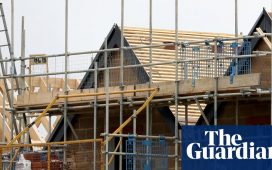Unlock the Editor’s Digest for free
Roula Khalaf, Editor of the FT, selects her favourite stories in this weekly newsletter.
The UK’s competition watchdog has launched an investigation into eight housebuilders over whether they shared commercially sensitive information after a year-long study into why Britain builds too few homes.
The Competition and Markets Authority said on Monday that the main reasons for the shortage of new homes were the UK’s “complex and unpredictable planning system” and the fact that housebuilding output was heavily reliant on “speculative private development”.
Only about 250,000 homes were built across the UK last year, short of the government’s target of 300,000 annually in England alone.
However, the CMA said that during its study it found evidence of information sharing between housebuilders that was not “one of the main factors in the persistent under-delivery of homes” but could “weaken competition”.
The watchdog said it had launched an investigation into Barratt, Bellway, Berkeley, Bloor Homes, Persimmon, Redrow, Taylor Wimpey and Vistry.
The news knocked the shares of the companies, with Persimmon dropping 4 per cent, Taylor Wimpey falling 3.9 per cent, Bellway and Vistry both down 2.5 per cent, Barratt Development off 1.2 per cent and Redrow also weaker.
The regulator said that during its year-long study into the shortage of new homes it had unearthed evidence indicating commercially sensitive information about the rate of sales, prices, and incentives may have been shared. The CMA released the findings of the study on Monday.
Tom Smith, competition lawyer at Geradin Partners and former CMA legal director, said the investigation “could result in large fines and potential follow-on litigation” for the companies.
The Home Builders Federation declined to comment on the probe. Bellway said it was co-operating with the CMA; the other housebuilders did not immediately respond to requests for comment.
The study, which examined issues including housing quality and land management, was launched a year ago after prompting by levelling up secretary Michael Gove.
At the time of the launch, the CMA pointed to “widespread concerns about housing availability and costs” and whether builders were “delivering the homes people need at sufficient scale or speed”.
Sarah Cardell, head of the CMA, said the watchdog was “recommending a streamlining of the planning system and increased consumer protections” that would “see many more homes built each year, helping make homes more affordable”.
Its finding that one of the key roadblocks to housebuilding was the planning system will strengthen the industry’s call for major reform at a time of high tensions between housebuilders and the government over planning policy.
“We welcome recognition that the planning system is a fundamental barrier to delivery . . . [and] that housebuilders do not land bank unnecessarily,” the HBF said.
The regulator found that so-called land banking by developers was not “significantly distorting competition” in the market. The practice of holding a stockpile of land has been a point of criticism against housebuilders. The finding that land banks are mainly a “symptom” of the slow planning system will probably be welcomed by the industry.
The CMA also raised concerns about quality control problems and estate management charges, “with homeowners often facing high and unclear charges for the management of facilities such as roads, drainage and green spaces”.
It urged the government to create new quality standards and an ombudsman to give consumers more recourse.
It found that there were limitations to the ability of private speculative development to deliver adequate housing supply, since “evidence shows that private developers produce houses at a rate at which they can be sold without needing to reduce their prices”.
The CMA’s key findings on the shortage of new homes
-
The planning system is a key barrier, ‘producing unpredictable results’ and delays
-
Housing supply is too reliant on private developers. Targets have only previously been reached when local authorities were building ‘significant supply’
-
‘Land banking’ by housebuilders is mainly a ‘symptom of the . . . complex planning system’ and not hurting competition in the industry
-
Housebuilders ‘don’t have strong incentives to compete on quality’, leading to serious problems such as collapsing staircases and ceilings. The government should establish a New Homes Ombudsman and a consistent rule book










